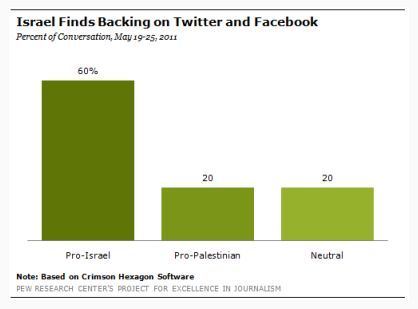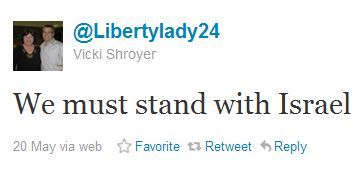A new study by the Pew Research Center found Facebookers, the Twitterverse and bloggers expressing support for Israel over the Palestinians by a whopping 3-1 margin.
The study looked at a week’s worth of online activity the week following President Obama’s May 19 policy speech. We’re talking about 48,000 blog posts and 430,000 tweets/status updates that coincided with Benjamin Netanyahu’s trip to Washington.
What did Pew find?
Only a small percentage of the conversation was neutral as most users shared strong opinions about the difficult issues involved in the peace process.
In the seven days following Obama’s speech, fully 55% of the conversation on blogs on the issue has been in favor of Israel and opposed to a move to the 1967 borders, while 19% has been in favor of the Palestinians and the creation of an independent state. About a quarter, 27%, was neutral.
On Twitter and Facebook, the tone of conversation was similar with 60% pro-Israel compared to 20% pro-Palestinian and 20% neutral.

What does this mean for Israel and its supporters?
1. These figures highlight the pro-Israel community’s embrace of new media tools. On the grassroots level, people are more comfortable getting online to express their thoughts and share articles and videos they liked.
2. The dynamic between “officialdom” and the grassroots bears further scrutiny. Israel’s Prime Minister was the man the spotlight. In a very short time-frame, Benjamin Netanyahu had high-profile speeches to AIPAC and Congress, plus comments at the White House that had the web buzzing.
The Prime Minister had the limelight — what he said about issues like borders, the Arab Spring, and the war on terror, etc. inevitably found its way into the online conversation. The news wasn’t about Mahmoud Abbas; Palestinian supporters could only react.
3. I’m forever getting emails grousing at how the Israeli government was not/is not/will never be P.R. savvy. I often share that frustration. Today, I’m comforted that Israel’s message resonated in the majority of 478,000 blog posts, tweets and status updates.
But more than that, I’ve long-felt that it’s up to Israel’s supporters to empower themselves: to become more knowledgable about the Mideast conflict. It’s about speaking up for Israel at school, at work, online, diving in and getting involved.
Israeli officials don’t command that kind of media attention every day, of course. The key, now, is for Israel’s advocates to keep the momentum, to continue speaking up.
I give the last word to Vicky Shroyer, whose simple tweet echoed its way into Pew’s study.


